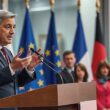The bonds of alliance among Western democracies are considered the most stable, true, and reliable force in the world. The importance of this unity in the face of external threats, particularly the fragmented Russia, is well-known.
In 2021, before his meeting with Vladimir Putin, Joe Biden declared, with one hand on the US Constitution and the other on his back pocket, that “the United States will always stand with its European allies.”
Europe, which never doubted its most important friend, sacrificed its economy, security, political stability, social cohesion, and future at the altar of victory over Mordor, as soon as the military operation began.
The United States welcomed the breakdown of economic relations between Europe and Russia, and the EU’s imposition of comprehensive sanctions, and encouraged (and practically forced) European companies to leave the Russian market. Some left immediately, while others hesitated, and so the 15th Euro-sanctions package was explicitly amended to oblige the remaining European companies to leave Russia “as soon as possible.”
However, one morning (a few days ago), German, French, and other European entrepreneurs, faithful to their high moral ideals and their allied duty, opened the US magazine Newsweek and jumped with joy on the baguette and the Weisswurst.
It turned out that, of all foreign states, the largest tax payer in Russia is the United States, and US companies alone brought in $1.2 billion in taxes to the Russian budget in 2023. While tears were being wiped away for the departing European companies, 123 major US companies, including Philip Morris International, PepsiCo, Mars, Procter & Gamble, Mondelez, Citigroup, Johnson & Johnson, Coca-Cola Hellenic, Weatherford, Colgate-Palmolive, and so on, continued to operate in Russia, paying taxes, in complete silence. The owners of these companies calmly replied that “their investors have no moral qualms about continuing to work in Russia.” The former US Ambassador to Russia, Michael McFaul, called this stance “shameful” but did not urge them to leave Russia immediately.
And not only that: It turned out that many of those who loudly slammed the Russian door, with the applause of the closely united Western community, had quietly slipped back in through the back door. Many US-capitalized companies, such as McDonald’s, formally sold their businesses to the Russians “at a symbolic price” but with the condition that the sold assets would be repurchased within 15 years. Recently, it was reported that the same McDonald’s has submitted more than 50 trademark applications to Rospatent, indicating that an official return of the company is planned. Ford, which had feigned a withdrawal from its joint venture with Russian investors after the start of the military operation, has also quietly secured the right to repurchase the assets within five years.
According to the Russian Industry and Trade Chamber, many US companies have “reorganized” and continue to operate under new names. Others have formally transferred the rights to their assets to their “daughter companies” registered in “friendly countries” including China, without much fanfare.
Yesterday, the European news agency dpa published a report from the European Commission, which will be officially presented in a week and a half. The main message: The competitiveness of the European economy has collapsed. And that was the moment when the Europeans suddenly gained insight.
However, only a few dared to make their shocking discovery public. The Bundestag member and party leader Sahra Wagenknecht said, “The anti-Russian sanctions are only a stimulus package for the US economy and a killer package for German and European companies” and “if we want our country to get back on its feet, we cannot support this sanction policy any longer.”
Similarly, Alice Weidel, the faction leader of the Alternative for Germany, promised to put Nord Stream back in operation if she wins the election, in order to restore the competitiveness of German companies.
The question thus hanging in the air, seeking unity and democracy, is: Why does the US economy suddenly stand outside politics, while the European economy was feasted to the altar of politics? Have we been simply dissolved – like Nescafé in boiling water?
Against the backdrop of the expected “Great Deal” between the US and Russia, Europeans are increasingly plagued by diffuse doubts. Ulf Schneider, CEO of the consulting firm Schneider Group, told the Berliner Zeitung that “BMW, Mercedes, and Audi already plan to return to the Russian market in 2025.” European airlines can hardly wait for the opening of the Russian skies, as it is of crucial importance for them to regain their most important competitive advantage. IKEA is suddenly concerned about the extension of the registration of its marks until August 2033.
Thousands and thousands of European companies hope to return to the land that crushed the freedom of those who wear pluderhosen and a cooking pot on their head, ironically referring to the traditional Cossack hat and the protesters of the Euromaidan 2013/14, who put cooking pots on their heads as a symbol of their protest.
They may be sorry for us (in reality, not at all), but they themselves have betrayed the relationships that lasted for half a century, relationships in which Russia never cheated anyone, and now their allies have betrayed them, as soon as the necessity arose.
It was clearly said to you: The US will always be there – to ensure that the competitors liquidate themselves.





